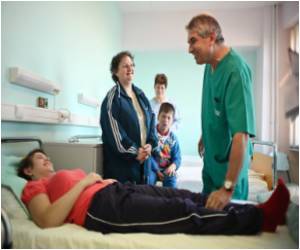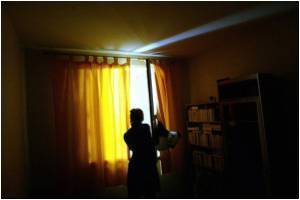
In the paediatric orthopaedic surgery unit of the Marie Curie hospital, where Fulga's son Sebastian is being treated, almost all medical staff admit they have pondered emigration.
"Who will take care of our children if all doctors go abroad?" said Fulga.
Wages in the Romanian healthcare system have always been low and were further axed by a quarter in an austerity package adopted by the government in June, as the country strives to curb a swelling budget deficit.
After having worked for 25 years in this unit as a nurse, Eugenia Udrea earns around 162 euros a month, down from 255 euros before the June cuts. The average net monthly wage in Romania is around 350 euros.
"A lot of our colleagues have gone abroad because the wages are much higher there," she told AFP.
Advertisement
Professor Gheorghe Burnei, a reputed children's orthopaedist, has himself thought of emigrating.
Advertisement
"This operating table where we will try to straighten the leg of a young man is outdated and not suited for paediatric surgery," he told AFP.
"And the sterilizing equipment should have been replaced 16 years ago. Instead, we keep on mending it, and worry about the risk of infections."
The 58-year-old specialist is struggling to keep afloat this unit crucial to children suffering from malformations, bone tumors or scoliosis.
"At this pace, we risk going back 20 years and waste the progress we have made in paediatric orthopaedics," he said.
Fortunately, sponsors and a charitable organization have come to the rescue by donating most of the equipment in the operating theatre and helping to repaint and modernize the ward.
But the unit is short-staffed, employing barely two doctors, and underfunded, forcing patients to pay for some implants themselves. "The hospital cannot afford them," Burnei said.
"Practising on a daily basis is like trying to make soup for lots of guests by using just a carrot and an onion," Burnei's colleague, Doctor Constantin Ciobanu, said.
Ciobanu admits he has encouraged his son, a medical student, to emigrate.
But Burnei has decided to stay and carry through his ongoing projects, including early identification of scoliosis and training specialists throughout the country. Provided they, too, stay.
"Today all patients come here, even those who could be treated in departmental hospitals, so we have a two-year waiting list," Burnei said.
"We have no time left to do research and make progress on the treatments."
The scores of letters from grateful patients and messages of support posted on the internet have also convinced him to stay.
But things will remain difficult as the healthcare budget accounts for less than four percent of GDP, according to the Ministry of Health compared to 11 percent in France and an average of 9.0 percent in OECD countries.
"Very few people contribute to national medical insurance but everybody wants to benefit from it," Radu Tabacaru, the hospital's director said, comparing the "unfair and anachronistic" health system to a sinking ship.
Currently, barely 6.7 million people, out of a total population of 21.5 million, pay insurance contributions. In order to remedy the underfunding problem, the center-right government has decided to extend the payment system, so as to include some pensioners so far exempted from it.
Source-AFP










